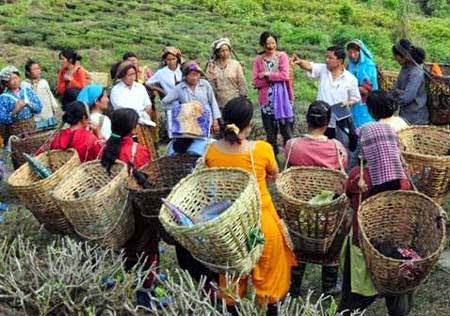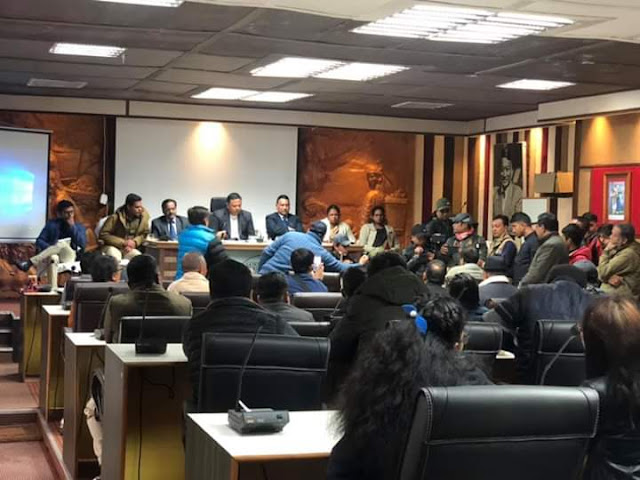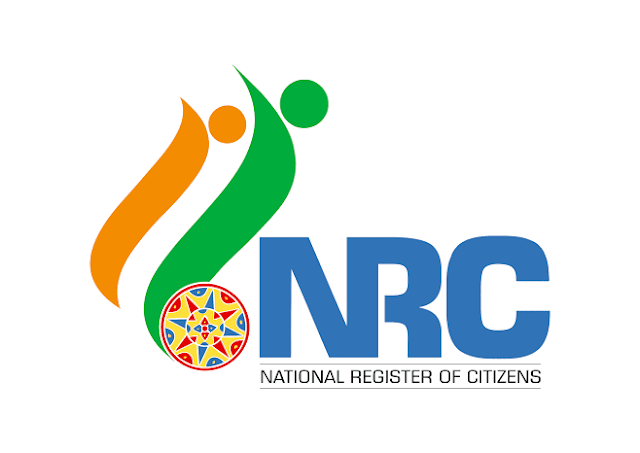Gorkhaland, a demand whose time has come: Demand of the sons of the soil and the myths that tarnish the movement
When Jamyang Tsering Namgyal of Ladakh gave one of the most passionate, factual and heart-breaking accounts of how Article 370 had kept the people of Ladakh deprived, discriminated against and treated as a second class citizens, he forced people across India and the world to take note. Far away from Ladakh from where he belongs, or Delhi where he was giving his speech, people in the Eastern Himalayan region of Darjeeling hills, Terai and Dooars were glued onto their TVs. For us here in Darjeeling region, Jamyang wasn’t just describing the pathos of Ladakh, he was resonating each and every sentiment that we the people aspiring for Gorkhaland statehood have felt and lived through in West Bengal.
 |
| Gorkhaland |
‘Gorkhaland’ the very name evokes strong sentiments – from a motley crew of passionate supporters to very dedicated gang of opposers, to a vast majority of well-meaning but clueless neutrals who irrespective of their understanding of the issue or absolute lack of it, comment on it passionately.
Trying to explain the nuances of the demand for a ‘Gorkhaland state’ individually is very difficult, which is why it is imperative to explain the finer details of Gorkhaland demand in detail.
I am basing this article on a Q and A format so that everyone reading the article will find it easy to understand the issue in depth.
Everyday Identity Blues:
Curious stranger: Hi! You look a little strange…Where are you from? Nepal?
Me: India
Curious stranger: Let me guess… North East
Me: Darjeeling
Curious stranger: Oh! It’s in Nepal no?
Me: No, it’s in West Bengal
Curious stranger: Nice! So you are a Bong? Do you speak Bengali?
Me: No, I am a Gorkha, and our lingua franca is Nepali.
Curious stranger: Huh! So you immigrated to India?
Me: No, I was born here
Curious stranger: When did your family come to India?
Me: We didn’t immigrate, we came with the land. We are indigenous to the land.
Curious stranger: Like… seriously?
Me: Yeah! Like very very seriously.
On and on, every day we the Gorkhas have to face one set or other of these series of questions. Our children and youth who have to leave home for study and work grow up with this “crisis of identity” where we have to assert and reassert our Indian-ness day in and day out.
In the plainest of terms, the demand for Gorkhaland state is an attempt on the part of people from Darjeeling hills, Terai and Dooars to do away with this “crisis of identity” that Gorkhas across India have and have had to face and to assert our Indian Identity. So when Jamyang spoke of the people of Ladakh wanting to become Indian for over 70-years, we here in Darjeeling absolutely understood what he meant. He was, in more ways than he knew to narrate our plight.
I hope the following series of Q and A will help many of you understand the demand and its implications.
Is ‘Gorkhaland’ a demand for separation from India?
Foremost, let us all be clear about one thing – the demand for Gorkhaland is not a demand for separation from India. It is a demand for the formation of a separate state within the constitutional and geographical contours of India. Much like how Jharkhand, Uttarakhand, Chattisgarh, Telangana were formed, people living in Darjeeling hills, Terai and Dooars have been demanding the formation of a separate state called Gorkhaland, away from West Bengal.
What areas are being demanded as Gorkhaland?
The aspired Gorkhaland region comprises of the districts of Darjeeling, Kalimpong, and parts of Alipurduars and Jalpaiguri.
Is there any historical context to these particular areas being demanded as Gorkhaland?
The History of Darjeeling hills, Terai and Dooars is distinguished by one peculiar aspect – it has always been in a state of flux. Given its geostrategic location, this region was a hotly contested landmass between Nepal, Bhutan, Sikkim, and Tibet. For centuries the dominant kingdom among these four took control of this region.
From 1662 until 1777 this region was under the Kingdom of Sikkim; however, in 1777 Nepal Army had defeated the King of Sikkim and established their dominance in this region. In 1816 the British Army defeated the Nepal Army, after which they took over and handed over these lands to the King of Sikkim as a gesture of friendship.
In 1835 the Brits took these lands on lease from the King of Sikkim to establish a sanatorium but ended up establishing their military garrison here. By the year 1866, the British had annexed the present day of Kalimpong and Doors from Bhutan following the defeat of Bhutan in the Anglo-Bhutan war of 1865, they then added this newly annexed area to the existing Darjeeling district – which we today know as Darjeeling Hills, Terai and Dooars.
It is these areas that never shared any history with Bengal, which the people here are demanding to be formed into a state called Gorkhaland.
Who are Gorkhas in the Indian context?
The ‘Gorkhas’ in the Indian context are Indian citizens of Nepali ethnicity, who live across the length and breadth of India. The term ‘Gorkha’ in the Indian context is used to differentiate the Indian citizens of Nepali ethnicity from the citizens of Nepal, who prefer to be called ‘Nepalese.’
Did the Gorkhas immigrate to India?
Majority of the people who identify themselves as ‘Gorkhas’ in India are sons and daughters of the soil, and their forefathers ‘came with the land.’ They did not immigrate to India. However, it is well recognized that there are many immigrants from Nepal, who have also settled in India, post-independence.
What do you mean by ‘came with the land’?
The Nepali kingdom in the 17th and 18th Century was spread all over the Himalayas. In the year 1777, Nepal had appropriated the Kingdoms of Sikkim, Kumaon, Garhwal and Kangra. However, following the Anglo-Nepal war of 1814-1816, Nepal agreed to cede most of the Terai region, the lands of Sikkim, Kumaon, Garhwal and Kangra to the British through the Treaty of Sugauli (Sugauli Sandhi), which was signed on 4 March 1816. After the Anglo-British war of 1865, the British appropriated the lands that are today known as Kalimpong and Dooars. Therefore, all the people of Nepali, Sikkimese, Tibetan and Bhutanese origin who were living in these tracts automatically came under the British and subsequently under India (after the British left), hence the term – ‘came with the land.’
Were there ‘Gorkhas’ in Darjeeling region prior to the British coming to India?
Recorded history shows that the region was inhabited as early as the 9th century. When Guru Padmasambhava had passed through this region in the 9th century, he had established Buddhism in the region – which indicates the presence of people living in the areaway, before the British ever landed in Asia.
In the Indian context, the word ‘Gorkha’ is an umbrella term used to identify a varied group of people, as one unified entity. In terms of Darjeeling communities such as the Róng – Lepchas, the Tsong – Limbus, the Kirat – Rai, the Dukpas, the Bhutias and the Magars are the aboriginal/ethnic/native people of the region, who constitute a large chunk of the ‘Gorkha’ people living in the Darjeeling region. Hence, it can be safely said that the majority of the ‘Gorkhas,’ who belong to these communities and are living in Darjeeling, ethnic to the region.
In addition, other groups of people such as the Gurungs, Thapas, Chettris, Newars, Sunwars, Bahuns, Kamis, Damais, Sarkis, Bhutias, Thamis etc, traversed these lands for trade or settled here following wars. For instance, the establishment of the Kingdom of Sikkim in 1642 brought in a large Bhutia population from Tibet and Bhutan into the region. Similarly, the Nepali incursions starting from as early as the 1700s brought many present-day Nepalis to the region.
While kingdoms changed, the people remained.
Over centuries the people from this region could be broadly categorized as – Nepali, Bhutia, Lepcha, Dukpa, Tsong, Rai, Magar of the hills, and Nepali, Dukpa, Koche (Rajbanshi), Meche, Rabha, and Toto of the plains.
Later Adivasis were brought in from Chota-Nagpur plateau to work in the tea gardens of Dooars, then Bengalis and another mainland Indians gradually came and settled in the region.
Around the 1890s the dominant Nepali-Bhutia-Lepcha groups subsumed the rest of the hill tribes into their fold and a unified identity “NeBuLa” was used to define the hill people. In Darjeeling, this gradually metamorphosed into the term “Gorkha”.
Hence, one can safely concur that the ‘Gorkha’ presence far supersedes the British arrival in the region.
It is important to note that today, the term ‘Gorkha’ is used to indicate people who are from this region – which today includes everyone from Bengali Gorkha, Bihari Gorkha to Marwari Gorkha etc.
When was the demand for Gorkhaland first raised?
The first demand for a separate administrative unit for the Darjeeling-Dooars region (a la Separate State in today’s term) was first raised by the Hillmen’s Association in 1907, making the demand for a separate state constituting the Darjeeling hills, Terai and Dooars region the oldest demand for statehood in India.
Why did the British not entertain this demand?
The only reason as to why such a demand was not entertained by the then British Government is because the Darjeeling and Dooars region was a highly contested geographical region which they had taken on lease from Sikkim and Bhutan. The British had declared our region to be a “non-regulated area”, which meant that the rules and laws developed for the rest of India would not be automatically applied to the region.
What historical claims does West Bengal have over the Darjeeling-Dooars region?
Ironically None! There is no shared history between the Darjeeling-Dooars region and the rest of West Bengal.
Historically, the district of Darjeeling never formed a part of Bengal and no King who ruled the plains of Bengal ever had any suzerainty over those areas. Ethnologically, the Mongoloid and semi-Mongoloid races inhabiting the Darjeeling hills, Terai and Dooars have more affinity with the Hill tribes of Assam than with the people in the plains of Bengal. Geographically the district of Darjeeling, Kalimpong, Alipurduar, Jalpaiguri and Cooch Behar are completely cut off and distinctly different from the rest of West Bengal. Linguistically, the people residing in this region have a greater affinity with Hindi, the Lingua Franca of India, than with the state language Bengali
Why is Darjeeling a part of West Bengal?
Darjeeling hills, Terai and Dooars were forcefully included into West Bengal without any consultation with the local populace using two flimsy acts enacted by WB Legislative Assembly:
The Requisitioned Land (Apportionment of Compensation) Act, 1949 (51 of 1949). Darjeeling District – transformed to the Absorbed Areas(Laws) Act, 1954.
The West Bengal Raw Jute Futures Act, 1948 (West Bengal Act No. 25 of 1948)
Why are people in Darjeeling demanding Gorkhaland?
The demand for a separate administrative unit (a separate state in today’s term) for the Darjeeling region had started as early as 1907. However, the influx of Bangladeshi refugees starting in 1965 and later state-sponsored illegal immigrants from Bangladesh post-1971 for vote bank by subsequent West Bengal governments led to the marginalization of the ethnic Gorkha, Kamtapuri and the Adivasi communities of the region. The demand for Gorkhaland is a demand to protect the identity, culture, history, traditions and the rich bond of people from the Darjeeling region, which they share with their land.
Furthermore, the Gorkhas from the Darjeeling region have continued to be labelled by the fascist and state-sponsored Bengali organizations such as Bangla O Bangla Bhasa Bachao Samity, Amra Bangali, Jan Jagaran Morcha, Jan Chetna Morcha as illegal immigrants and the demand for Gorkhaland illegal. They have rendered the ethnic Gorkha people as an intruder in his/her own ancestral lands. This has caused widespread socio-economic and political marginalization of the Gorkhas. All these factors have resulted in the Gorkhas being under-represented, stereotyped and communally discriminated in almost all sectors.
Moreover, Bengal has always been colonial in its approach to this region. The large revenues collected from the Darjeeling region have been used to develop other parts of Bengal while neglecting even the basic infrastructure in the region.
Case in point: Since the year 2002, over 3000 malnutrition-related death (death due to starvation) have been reported from the tea gardens of this region and yet the West Bengal government has not taken any steps to alleviate the sufferings of the people in the region. Instead, they have continued to deny the tea garden workers minimum wages.
Is the proposed Gorkhaland region economically viable?
The proposed Gorkhaland region is rich in bio-diversity, scenic views, hydro potentials, tourism, NTFP, Tea and numerous other resources, making this a resource-abundant region.
Currently, the aspired Gorkhaland region contributes to the least 20-23% of the total revenue collected in West Bengal. Even the most conservative estimates put the revenue potential from tea, tourism and hydro from the proposed Gorkhaland area at over 20,000 Crores per annum. In return, West Bengal only spends around Rs 5000 crores in the region annually (including salary paid to Govt officials). Thus, draining off a large portion of the revenue collected from the region.
It is estimated that the revenues from Tea and Tourism alone will make the proposed Gorkhaland region a revenue surplus state.
The revenues collected from hydro development, NTFP, cross-border trades and other resources will make the proposed state of Gorkhaland as one of the most economically vibrant states in India.
What is Chicken Neck region and how will Gorkhaland impact the National Security or our nation?
Darjeeling district is home to the proverbial “chicken neck” region, a roughly 200-km stretch which borders four nations — Nepal, Bhutan, Bangladesh and Tibet — in distances varying from 25 kms to 60 kms. It has seen a large-scale influx of illegal migrants from Bangladesh, which started as a trickle in 1965 and turned into a gushing torrent post the 1971 Indo-Pakistan war, that lead to the creation of Bangladesh.
The ‘Siliguri Corridor’ has today become one of the most porous border regions in the world, and Pakistan’s ISI has used this to operate its agents freely. In fact, in 2002, the writer Pinaki Bhattacharya had highlighted how the ISI was using the ‘Siliguri Corridor’ as a supply route to provide arms and ammunition via Bangladesh to insurgents in the North East. Following investigations into the Burdwan bomb blast, in May 2015, the National Investigating Agency released a report that explained how Jamaat-ul-Mujahideen Bangladesh (JMB) had networks in West Bengal and lower districts of Assam, and that JMB had been using West Bengal as a safe sanctuary.
Given all this, if there is one state in India which is actually a safe haven for terrorists, it is West Bengal, and if the state government was capable of addressing national security concerns, it would have done so a long time ago. The presence of ISI modules and terrorists of the various ilk in Bengal actually prove that the state government in Bengal isn’t able to protect the vulnerable “chicken neck” area.
One possible reason for this could be that the state capital and its power centre, Kolkata, is located too far away from the region, because of which the state administration isn’t able to focus much on the north Bengal districts.
A state of Gorkhaland, including the hills of Darjeeling, Terai and Dooars, would, therefore, help ensure better safety and security for the “chicken neck” area. Smaller states are also easier to govern and the presence of the entire state machinery being in one region would help keep close tabs on infiltrators, unlike what is possible out of Kolkata.
Why is West Bengal opposed to the formation of Gorkhaland?
The state of West Bengal is one of the most economically backward states in India. Even though it is the 5th largest in terms of its size, but due to the high debt burden of over Rs. 4.35 lakh Crores, West Bengal is practically bankrupt and is highly dependent on the Central Government and the revenues generated from the proposed Gorkhaland region for its sustenance and economic survival.
So despite all the rhetoric stating, “Darjeeling is Bengal’s Abhinno Aanga,” Bengal is scared of losing its hen, which is currently laying the golden eggs. It is scared of losing the cash cow that has continued to discount the development of Bengal’s other regions over and over since independence.
Further, Bengal has always held a parochial, colonial and discriminatory attitude towards the proposed Gorkhaland region and continues to do so. Every time the Gorkhas have demanded justice or our rights, we are labelled as intruder, terrorists, and foreigners in our own land.
Hence the urgent need for Gorkhaland state to be formed.
We are hopeful that someday soon, our Member of Parliament from Darjeeling will also be able to speak with the same passion and emotion that Jamyang Tsering Namgyal did and tell the nation how the formation of Gorkhaland state or Union Territory will benefit mother India.
** This article was written by Mr Upendra Mani Pradhan, a Darjeeling-based Political Analyst [Twitter: @jorebungley] and co-authored by Dr Vimal Khawas, an Associate Professor in the Dept of Peace and Conflict Studies, Sikkim University [Twitter: @vimalkhawas]
[ Via: https://www.opindia.com/2019/08/gorkhaland-a-demand-whose-time-has-come-demand-of-the-sons-of-the-soil-and-the-myths-that-tarnish-the-movement/ ]
























